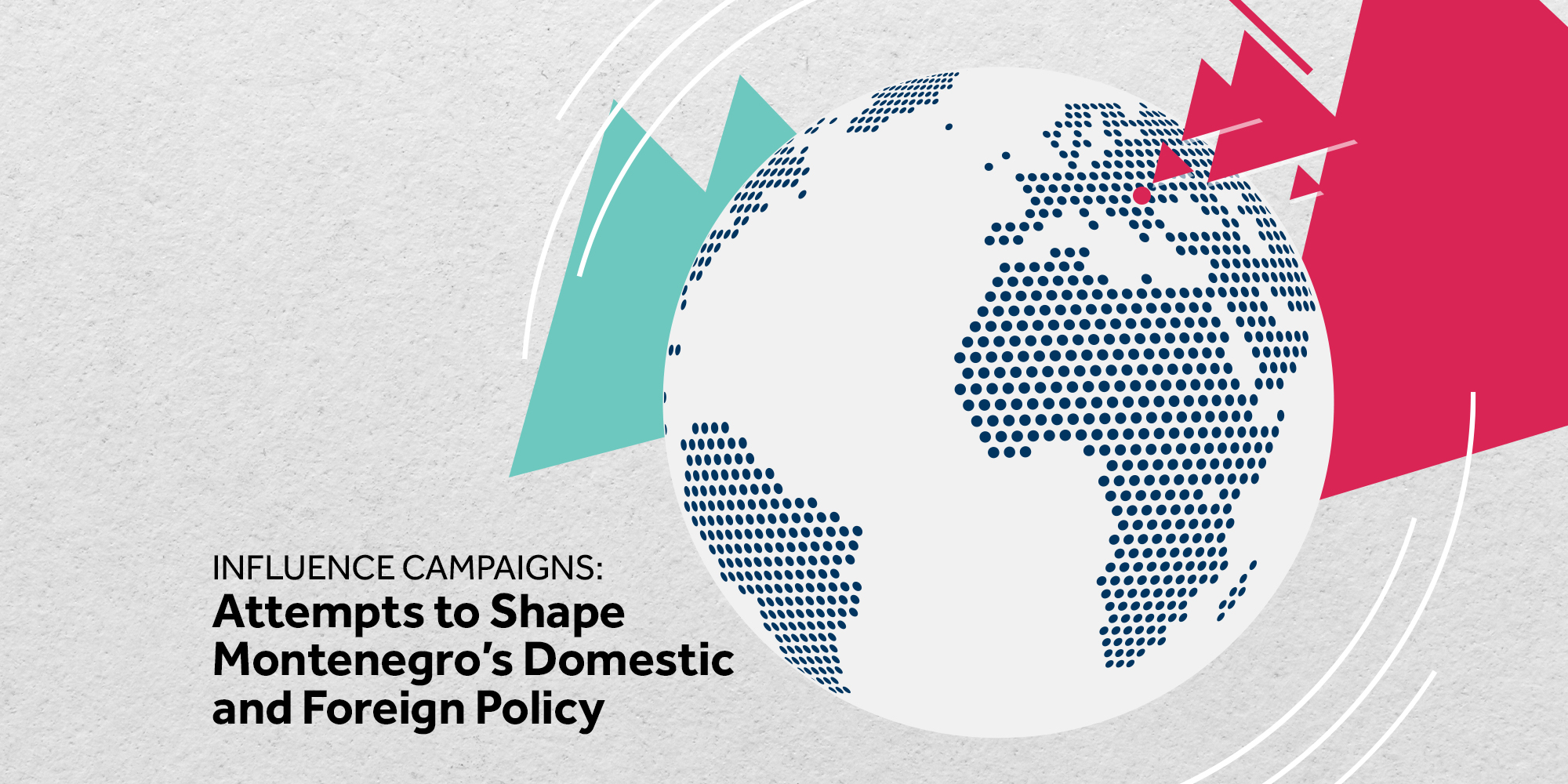Montenegro and its society are facing a rapid expansion of policies and ideas that directly oppose Montenegro’s strategic orientation. Numerous actors from Serbia and their proxies in Montenegro are attempting to influence the country’s Euro-Atlantic course, despite declarative assurances that it will neither be changed nor questioned in any way. The lack of strong and democratic institutions is one of the reasons why Montenegro is vulnerable to the malign influence coming from Serbia.
Serbia’s efforts and strategic goals can be observed through its hybrid activities aimed at obstructing Montenegro’s European integrations while encouraging anti-Western narratives and sentiments within Montenegrin society. The interference of Serbia in Montenegro’s internal affairs and foreign policy path is particularly evident during significant socio-political events in the country. The UN Resolution on Srebrenica Genocide served as a demonstration exercise of Russian-Serbian hybrid activities towards Montenegro. Various actors close to official Belgrade attempted to influence the Government of Montenegro in the decision-making process regarding the Resolution, creating a socio-political environment that narratively portrays Serbs as a genocidal people in the Western Balkan region.
The United Nations General Assembly adopted the Resolution on Srebrenica Genocide on May 23, 2024. The document was supported by 84 votes in favour, 19 voted against, and 68 abstentions. Montenegro supported the Resolution despite numerous pressures and attempts to dissuade the Government and its Prime Minister, Milojko Spajić, from doing so. The Resolution declares July 11 as the International Day of Remembrance for the victims of the Srebrenica genocide and condemns the denial of genocide and glorification of war criminals. Although the text of this document does not mention Serbia or the Serbian people, official Belgrade opposed the adoption of the Resolution all along, claiming that its adoption in the UN would declare the Serbian people as genocidal. In the extensive campaign to obstruct the adoption of this Resolution initiated by Serbian President Aleksandar Vučić, all pro-Serbian and pro-Russian proxy actors in Montenegro and the region were involved.
The issue of the Srebrenica Resolution undoubtedly drew significant attention in Serbia, the Bosnian-Herzegovinian entity the Republic of Srpska, and Montenegro. The intensive campaign aimed at preventing Montenegro from supporting the Resolution at the UN General Assembly session was accompanied by political turmoil, blackmail, social polarization, tensions, protests, and information manipulation. Political actors, church dignitaries, the media, organizations with Serbian national affiliation, and numerous activists from various spheres of life from Montenegro and Serbia played a significant role in the propaganda campaign.
Pro-Serbian and pro-Russian structures in Montenegro and actors in the region urged Prime Minister Milojko Spajić and the Government of Montenegro not to vote for the Srebrenica Resolution, as doing so would betray Serbia, label Serbs as a genocidal people as well as Montenegro as a genocidal state, thereby showing that they are under the dominant influence of Western power centers. The strong campaign conducted by domestic and regional propaganda actors was aligned with the efforts of the regime in Serbia and pro-Serbian actors in Montenegro, which are contrary to fundamental European values.
Political Structures
The announcement of Prime Minister Milojko Spajić that Montenegro would support the United Nations Resolution on Srebrenica Genocide served as a trigger for launching a hybrid influence campaign against Montenegro. The narrative of Montenegro’s hostile attitude towards Serbia, as well as the claim that the Serbs are being labeled as genocidal, was channeled by state officials from Serbia and the Republic of Srpska, and adopted by pro-Serbian proxy actors from Montenegro.
The key narrative of Montenegro as a state that does not independently decide on the Srebrenica Resolution was disseminated by Serbian President Aleksandar Vučić. His statement that Serbia does not tell Montenegro what to do, unlike those who come to tell it how this or that should be done, is consistent with the disinformation narrative about Montenegro as an ambassadoristan, which was directed from official Belgrade before the formation of the 44th Government. Furthermore, Vučić emphasized the narrative that Montenegro does not independently decide on its foreign policy after Maja Vukićević, as the head of the Montenegrin delegation to the Committee on Political Affairs of the Parliamentary Assembly of the Council of Europe (PACE), voted against the proposal for Kosovo to become a member of the Council of Europe on March 27, 2024. He then accused the Minister of European Affairs, Maida Gorčević, of going to Prishtina to apologize to the Americans.
The key narrative of Montenegro as a state that does not independently decide on the Srebrenica Resolution was disseminated by Serbian President Aleksandar Vučić. His statement that Serbia does not tell Montenegro what to do, unlike those who come to tell it how this or that should be done, is consistent with the disinformation narrative about Montenegro as an ambassadoristan, which was directed from official Belgrade before the formation of the 44th Government. Furthermore, Vučić emphasized the narrative that Montenegro does not independently decide on its foreign policy after Maja Vukićević, as the head of the Montenegrin delegation to the Committee on Political Affairs of the Parliamentary Assembly of the Council of Europe (PACE), voted against the proposal for Kosovo to become a member of the Council of Europe on March 27, 2024. He then accused the Minister of European Affairs, Maida Gorčević, of going to Prishtina to apologize to the Americans.
At the Summit of Leaders of the Western Balkans on May 16, 2024, in Kotor, Vučić stated that he had no message for Montenegro regarding the adoption of the Srebrenica Resolution and that Serbia would act towards other countries following their voting in the UN. Appearing on TV Prva on May 25, 2024, he stated that Montenegro’s behavior regarding the UN Resolution on Srebrenica was most disgusting and that Serbia would not send a note of protest to Montenegro because they voted that we are genocidal.
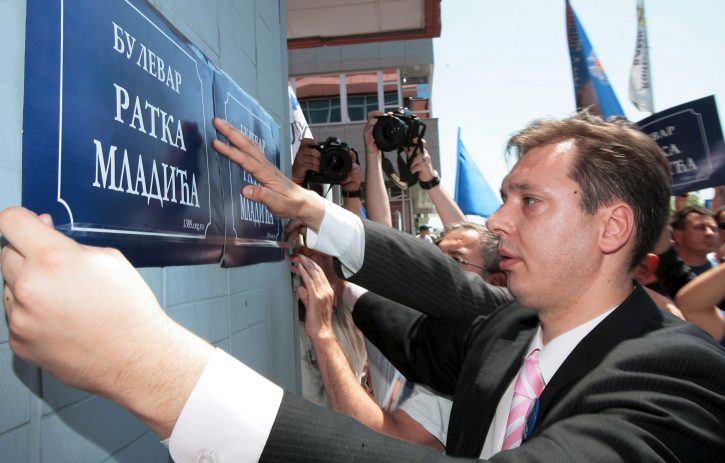
Prime Minister of Serbia Miloš Vučević stated on May 11, 2024, that he does not see Montenegro’s support for the Resolution as a friendly act. The systematic hybrid actions of the Serbian state leadership, through the statements of the Minister of Foreign Affairs Marko Đurić that Montenegrin amendments to the Resolution are a cleansing of conscience, and of Minister of Internal Affairs Ivica Dačić that a country where Serbs make up more than a third of the population is voting for the Resolution depicting Serbs as a genocidal people, aimed to induce paralysis in the decision-making process among the Montenegrin authorities.
Deputy Prime Minister of the Republic of Serbia, Aleksandar Vulin, stated on May 11, 2024, that Montenegro’s vote for the Srebrenica Resolution is an act of hostility, and that Montenegro belongs to the group of countries demanding Serbia impose sanctions on Russia and recognize the independence of Kosovo. For Vulin, Montenegro’s vote in the UN for the Resolution is a step towards Greater-Albania integrations.
Parallel with the political actors from Serbia, the disinformation narrative about the continuation of a brutal policy towards the Serbian people was channeled from the Republic of Srpska through its president, Milorad Dodik.
The regime in Serbia uses political events of regional significance to disseminate disinformation narratives that polarize the societies of the Western Balkans. Similarly to the process of forming the 44th Government of Montenegro, when the dominant narrative was that of Montenegro as ambassadoristan, meaning that Western embassies were forming the government without Serbs, in the case of the UN resolution on Srebrenica, identical proxy actors disseminated the narrative that Serbs were being declared a genocidal people. The asymmetric actions of political proxies in Montenegro reflected in adopting the aforementioned narratives and channeling an anti-European agenda. Parallel with conditioning support for the government, the President of the Democratic People’s Party, Milan Knežević, stated that by voting for the Resolution, besides Serbia, Montenegro becomes a state with a genocidal past. On May 12, 2024, during the ceremony of the Remembrance Day of the victims of the Crimes in Jasenovac at Donja Gradina, the President of the Montenegrin Parliament, Andrija Mandić, announced that he would exert pressure on Spajić and the Government to abandon the dangerous intention to support the UN Resolution on Srebrenica.
Serbian political proxy actors employ asymmetric methods to achieve the political goals of third parties. In the case of voting on the Srebrenica Resolution, Andrija Mandić proposed that the Montenegrin Parliament adopt a resolution on the genocide in Jasenovac. The Coalition For the Future of Montenegro (FTFOM) used identical methods in May 2023 when Kosovo applied for full membership in the Council of Europe. At that time, the local government of the Municipality of Zeta, predominantly composed of representatives of the FTFOM coalition, proposed adopting a resolution to revoke recognition of the independence of Kosovo. The systematic pressure from pro-Serbian organizations, political actors, and media on the Montenegrin Government, parallel with the refusal of parts of the parliamentary majority to vote for sending troops to a NATO mission, encapsulates the actions of pro-Russian politics in Montenegro. Pro-Russian and pro-Serbian actors exploit methods to antagonize Montenegrin society and hinder its path towards EU integration regarding the topic of the UN Resolution on the Srebrenica Genocide. The DFC, in the analysis Influence Operations Leading Up to the Formation of the Government, mapped identical proxy actors who, through the disinformation narrative of the endangered Serbian identity, undermined the formation of the 44th Government of Montenegro. Depending on socio-political events, the pro-Serbian ecosystem, consisting of political parties and their leaders, media, analysts, and Church representatives disseminates narratives that homogenize the Serbian national community and act as an extended arm of Aleksandar Vučić’s regime. In order to secure greater support for the narrative of the genocidal Serbian people, pro-Serbian proxies in power in Montenegro are attempting to change Montenegro’s foreign policy priorities and align them with the interests of Serbia.
Serbian Orthodox Church
Serbian Orthodox Church (SOC) represents a key instrument of the regime in Belgrade for direct interference in internal affairs in Montenegro. The SOC is present in all aspects of public life in Montenegro and has, for many years, been among the institutions in which the citizens of Montenegro have the highest level of trust.
Public appearances of SOC representatives crystallized the anti-democratic and anti-liberal nature of that religious organization, continuously promoting historical and cultural revisionism and denialism. The narratives disseminated by the Serbian Orthodox Church on the Montenegrin public scene are aligned with the Belgrade regime. Most often, the basis of those manipulations is the narrative of the endangered Serbian people in Montenegro, which aims to polarize and radicalize Montenegrin society. Additionally, SOC dignitaries constantly spread disinformation narratives aimed at creating an anti-Western sentiment among Montenegrin citizens.
The United Nations Resolution on the Srebrenica genocide confirmed these theses. Aligned with representatives of the Serbian authorities and their local proxies, church dignitaries were an important part of the propaganda campaign related to the Resolution. As an important socio-political player in Montenegro, the goal of the SOC is to exert additional pressure on the Montenegrin authorities while simultaneously undermining Montenegro’s strategic foreign policy objectives.
The disinformation narratives spread by Patriarch Porfirije, Metropolitan of the Serbian Orthodox Church in Montenegro, Joanikije, and Bishop of Budimlja-Nikšić, Metodije, are based on the denial of the Srebrenica genocide, the relativization of that crime, and the narrative of the collective guilt of the Serbian people.
The head of the SOC, Porfirije, stated in his Easter Epistle that the proposers of the United Nations Resolution on the Srebrenica genocide are attempting to label the Serbian people as perpetrators of genocide.
In his statement, Metropolitan Joanikije, besides denying the genocide in Srebrenica, also called on Montenegro not to vote for the Resolution, putting both internal and regional stability into question.
Bishop Metodije of Budimlja-Nikšić touched upon the topic of the adoption of the Resolution on the Srebrenica genocide in his Easter Epistle. He quoted a part of the message from Serbian Patriarch Porfirije urging people to raise their voices strongly and point out the unprecedented attempt at historical revisionism in which the Serbian people, victims of multiple genocides and ethnic cleansing, are being declared perpetrators of genocide.
Similar messages were also conveyed by Bishop Kirilo Bojović, Bishop of Buenos Aires and South-Central America, and the Administrator of the Metropolitanate of Zagreb-Ljubljana, as well as by Archpriest-Stavrophor Velibor Džomić.
In addition to the clergy, Orthodox brotherhoods close to the Serbian Orthodox Church, such as Miholjski Zbor and Zavjetnici Tvrdoš Nikšić, also joined the campaign. They disseminated the narrative on social media that Srebrenica was not a genocide, suggesting that Spajić/Milatović should consider what burden and trouble they are placing on themselves and their families as long as they live should they label our people in this way. Those brotherhoods also supported the initiative by the IN4S portal for urgent, unified, and strong action by all Serbian public entities to thwart the intention of part of the Montenegrin executive power to support the proposed Srebrenica Resolution. Members of the brotherhoods were present at the protest in front of the building of the Government of Montenegro ahead of the United Nations General Assembly, during which the protestors chanted in support of Kosovo, shouted slogans for Ratko Mladić, carried Serbian and Russian flags, and wore shirts with the letter Z, a symbol of the Russian aggression in Ukraine.
The Media
Regional and domestic media, known for their disinformation and propaganda campaigns during important socio-political events and processes in Montenegro, played a significant role in the campaign to influence the Montenegrin government not to vote for the Srebrenica Resolution at the United Nations (UN). The issue of the Srebrenica Genocide Resolution once again demonstrated that foreign malign influence through the media in Montenegro poses a serious challenge to social stability and democratic processes in the country. Media manipulations and narratives, especially on such sensitive topics, can considerably contribute to the further polarization of Montenegrin society. Daily media monitoring leading up to the General Assembly of the United Nations session revealed synergistic action of media, political subjects, church dignitaries, activists, and analysts. By channeling disinformation narratives that claim the Resolution qualifies the Serbian people as genocidal, the Serbs are endangered in Montenegro, and that Western power centers influence decisions and stances of the Montenegrin government, Serbia seeks to exert influence with the primary interest of aligning Montenegro’s foreign policy with Serbia by any means and be a step closer to the realization of the idea of the Serbian world.
During the strong media campaign, the actions of the unregistered pro-Serbian and pro-Russian portal IN4S were particularly prominent. Following the announcement of Prime Minister Milojko Spajić during the Prime Minister’s Question Time on May 9, 20204, that the Government of Montenegro would vote for the Srebrenica Resolution at the UN, the IN4S portal called for organized resistance against the intention of declaring the Serbs as genocidal people. The portal, which led a strong campaign It’s not Montenegrin if it’s not Serbian during the population census, about which the DFC wrote in detail in the study Unbreakable Bonds or Geopolitical Strategy, called upon the Serbian Orthodox Church this time, particularly upon the Metropolitanate of Montenegro and the Littoral and Metropolitan Joanikije, to excommunicate from Orthodoxy all members of the executive power and others from all levels of government in Montenegro who declare their support to the Srebrenica Genocide Resolution and are of Orthodox faith. They also called upon the representatives of the Serbian political parties in the Parliament of Montenegro to withdraw support to the Government of Milojko Spajić, and all Serbian political leaders, prominent cultural, social, and other public figures, media, associations of citizens, and individuals to organize and resist the shameful and wicked intention of the Government. The announcement of organized people’s protests of the IN4S was supported by the President of the Serb League Aleksandar Đurđev, the warmongering propagandist from the war times of the 90s, Milijana Baletić, and the President of the Union of Serbs from Montenegro, Željko Čurović, who organized protest car rides in Serbia in 2020 as a means of support to the Orthodox people in Montenegro due to the passing of the Law on Freedom of Religion.
The pro-Serbian portal Borba operates according to a similar matrix as IN4S, disseminating narratives that Milojko Spajić and the Government are continuing the policy of confrontation with the views of the Serbian Orthodox Church and that Spajić will be remembered as the first prime minister of a country who declared a third of its population as genocidal. Borba, in numerous texts on the topic of the Resolution and the decision of the Government, states that Milojko Spajić is hypocritic, continues to follow the anti-Serbian and anti-Church policy, and that Western countries are forcing him to vote for the shameful Resolution at all costs, which the entire SOC and the people of Montenegro are against. The Borba portal used the situation surrounding the Resolution to disseminate the narrative about how the Serbs are endangered and deprived of rights in Montenegro, a narrative that has been filling the columns media in Serbia and pro-Serbian media in Montenegro for years. The narrative highlights that Serbian people in Montenegro have a noose around their neck and that they are in an unfavorable position. Borba also highlights that by voting for the Resolution, the relations between Montenegro and Serbia will be permanently damaged, as it represents another stab in the back of Serbia by the Montenegrin authorities. Additionally, this pro-Serbian portal refers to the group of non-governmental organizations that welcomed Prime Minister Milojko Spajić’s stance that Montenegro should vote for the proposed Resolution as Local Soros’ men, attempting to portray them as paid agents in the public eye, and also to expose them to pressure and attacks, thereby creating an atmosphere of fear and self-censorship.
The editor-in-chief of the Aloonline.me portal, Vladimir Vuković, a former external consultant to the Ministry of Education, Science, Culture, and Sport in the Government of Montenegro during the mandate of Vesna Bratić, posted on his Facebook profile and portal that behind everything the Prime Minister of Montenegro Milojko Spajić does, like a puppet, related to the Resolution on the alleged genocide in Srebrenica, which is being prepared in the UN General Assembly, stands, in fact, Bishop Grigorije. It is further stated that the Bishop of Dusseldorf and all of Germany created his own network in the region, which he manages on behalf of Western services.
The campaign aimed at pressuring the Prime Minister and Government of Montenegro was joined by media from Serbia, whose negative actions during important socio-political processes in Montenegro were pointed out on several occasions by the DFC through its studies and analyses. The issue of the Srebrenica Resolution has shown and confirmed that Serbian media reporting on Montenegro is characterized by sensationalism and manipulation of information aimed at the broader Montenegrin public. Regarding Prime Minister Milojko Spajić’s announcement of support for the Resolution, Serbian tabloids published sensationalist and tendentious headlines, emphasizing that it is a scandal and disgrace. After Montenegro supported the Srebrenica Resolution, Serbian tabloids continued the campaign, disseminating narratives and insults directed at Montenegro, while also targeting the Montenegrin representative at the United Nations who voted.
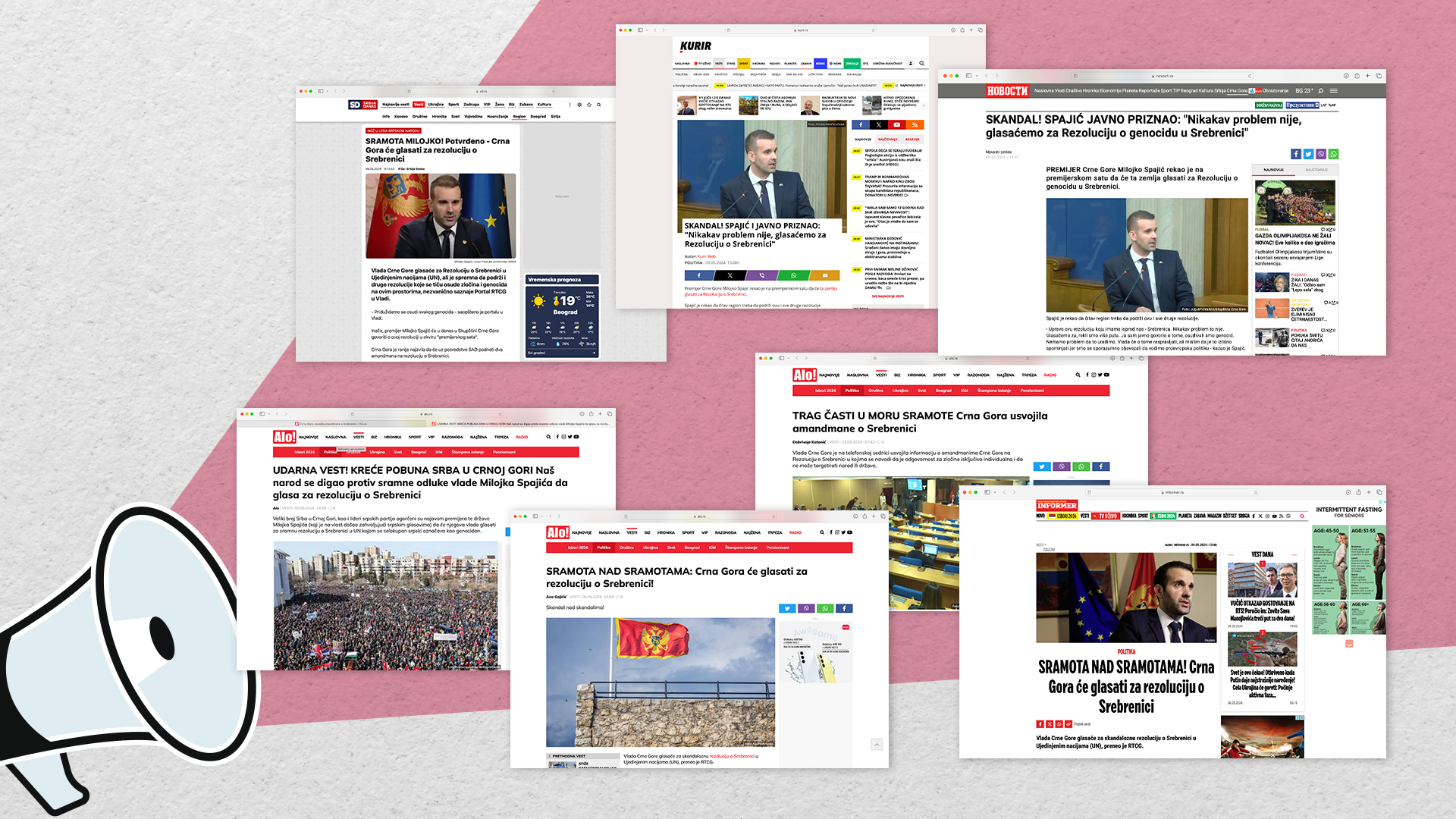
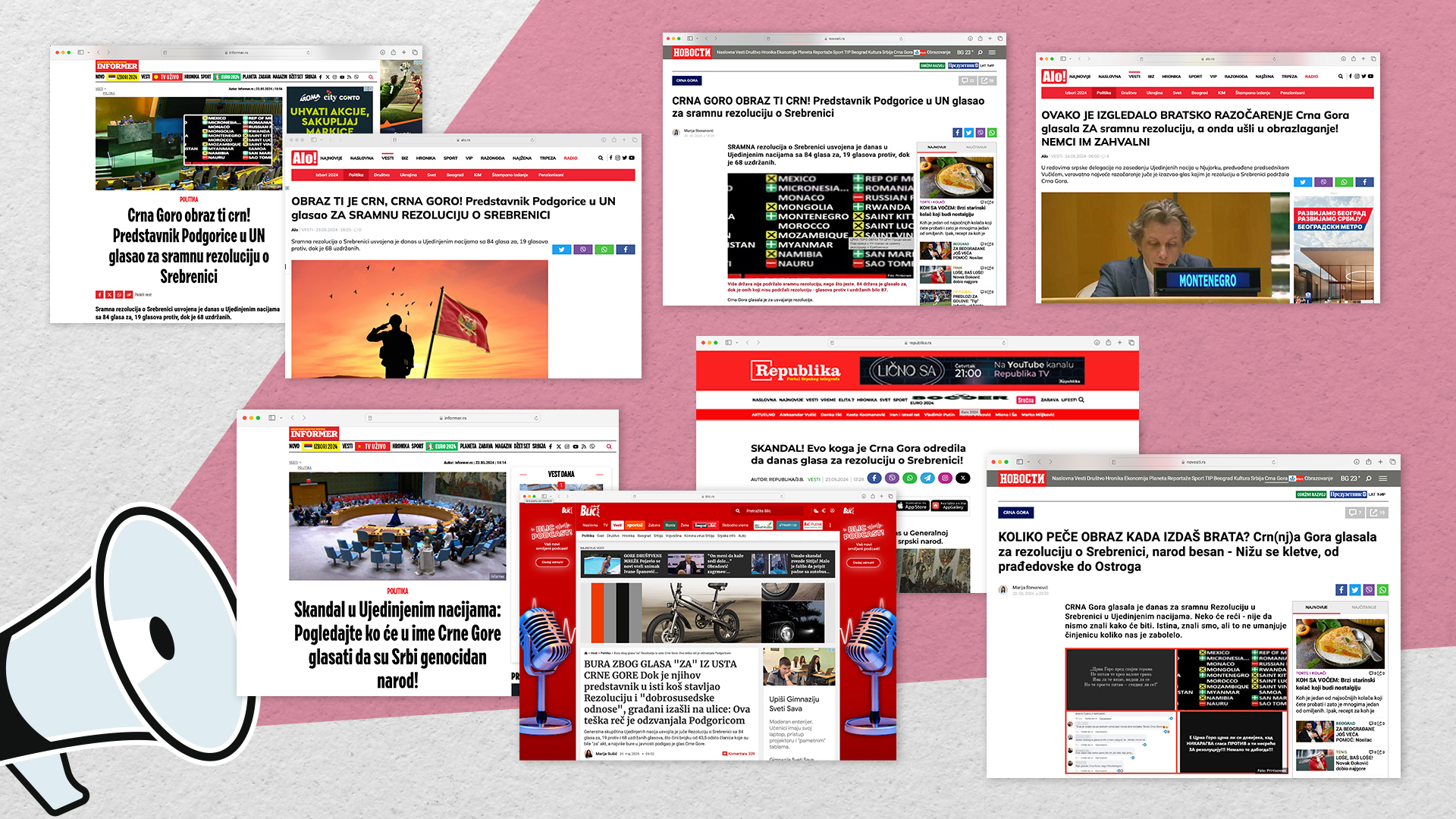
The outlets of Russian state propaganda media based in Belgrade Sputnik Srbija and RT Balkan were also active in disseminating anti-Montenegrin and pro-Serbian narratives. RT Balkan noted that a scandal erupted in Podgorica because Montenegro will vote for the Srebrenica Resolution, while interlocutors from Sputnik Serbia, political scientist Vladimir Pavićević, professor Časlav Koprivica, and historian Bogdan Živković, discussed whether it would shake Spajić’s government and harm relations with Serbia, raising the dilemma of whether the proposed amendments on the resolution text represent a transparent game by Montenegro and whether Spajić will listen to the West or the Serbs.
Social Media
Intensified activities leading up to the decision of the Government of Montenegro regarding the vote on the Srebrenica Resolution were also observed in the online sphere. Numerous Facebook pages, groups, and profiles attempted to influence the decision of the Government of Montenegro or incite tensions and divisions in Montenegrin society through activities on that platform. Leading up to the United Nations General Assembly session, the Digital Forensic Center monitored and analyzed activities on social media, focusing on identifying disinformation campaigns, narratives, and coordinated inauthentic behavior aimed at influencing public opinion.
The Facebook page Nikšić ponosni srpski grad, about which the DFC wrote multiple times and which consistently publishes texts from the IN4S portal and the official pages of the For the Future of Montenegro coalition and parties that are its constituents, was also active on the topic of the Srebrenica Resolution. This Facebook page posted a photo of a group of people carrying the flag of the Republic of Srpska with the caption To Milojko Spajić! We are the children of St. Basil, not a genocidal people! Everyone is born to die once, honor and disgrace live forever. This post was shared through coordinated activities of two profiles into a network of Facebook groups and pages with indicative names: Глас Срба Републике Српске, СРПСКО ЛЕГЛО, ZA NAŠU REPUBLIKU SRPSKU, Podrska za Slavka Perosevica, NE DAMO SVETINJE, Православна ризница, Наш Манастир Златеш Томашево, PODRŠKA VLADIMIRU LEPOSAVIĆU, Genocide against Serbs – ИСТРЕБЉИВАЊЕ СРБА, „ВЈЕРА У ХРИСТА“, СВИ СРБИ ИЗ ЦГ У ЈЕДНОЈ ГРУПИ, .СВЕТОСАВСКА ЦРНА ГОРА… Those Facebook profiles, groups, and pages were active during electoral cycles in Montenegro and operated according to the same matrix of sharing content in a short time frame and interacting to achieve greater visibility.
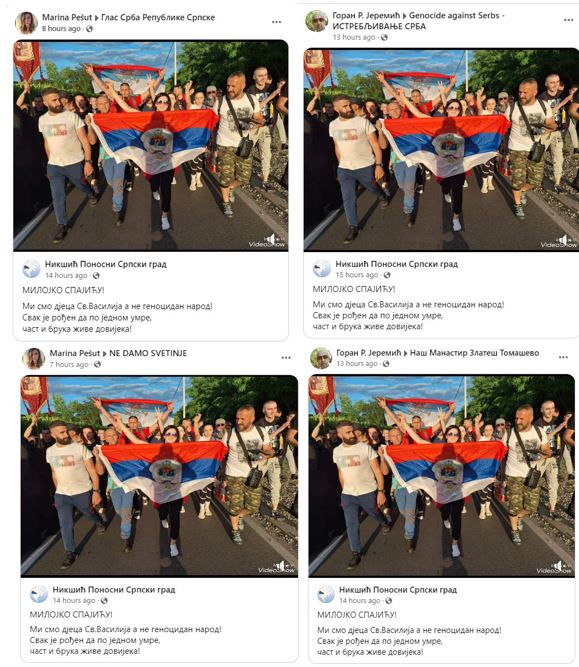
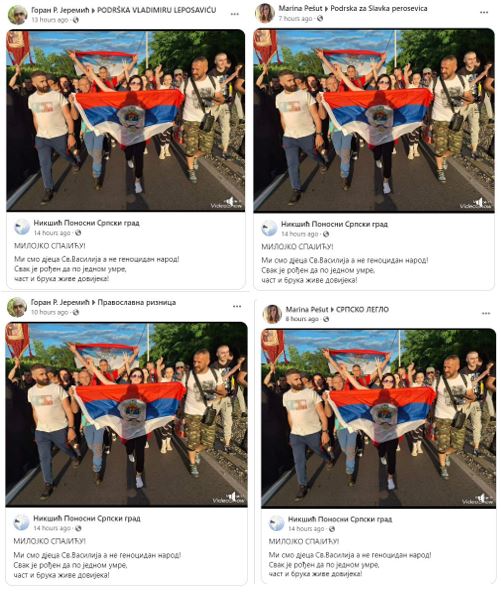
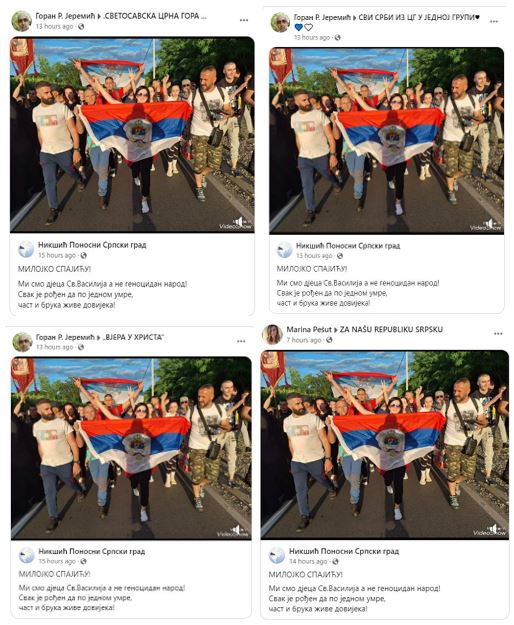
The Facebook page Историја Срба shared the same post, calling for all approaches to Montenegro and all roads in Montenegro to be blocked until the decision to vote on the Srebrenica Resolution is changed, adding that Montenegro must stop and that it will happen 1918 again. That page states that the problem lies in the existence of the state of Montenegro, not in its government and that it is, therefore, necessary to abolish Montenegro just as our ancestors did at the Podgorica Assembly in November 1918.
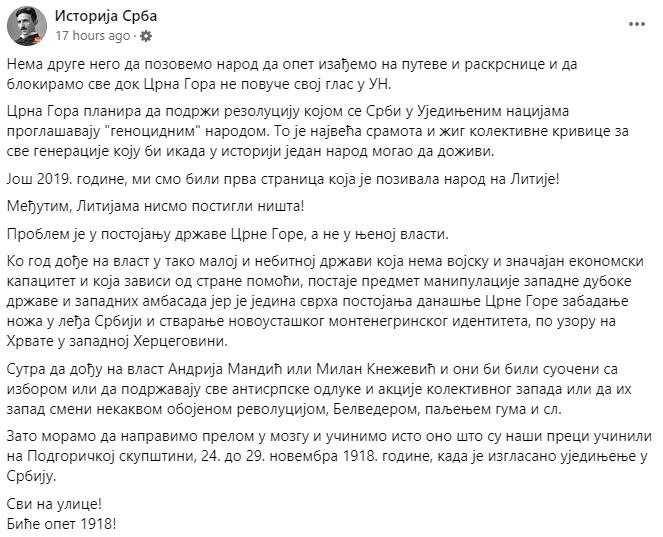
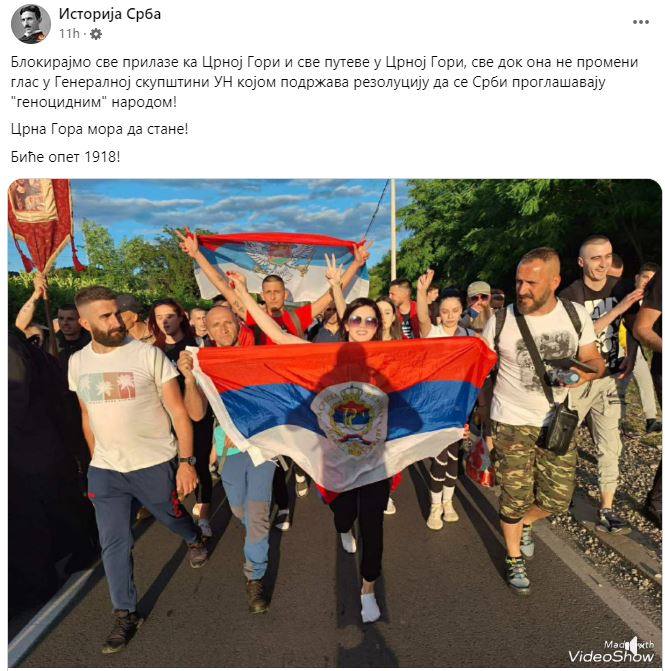
Identical profiles shared the post from the official page of Andrija Mandić in the same groups. The post is a video of Andrija Mandić’s speech in which he announces that the Serbian politicians, together with the Church and the Serbian people, will do everything in their power to stop Prime Minister Spajić in his dangerous intention to support the Srebrenica Resolution.
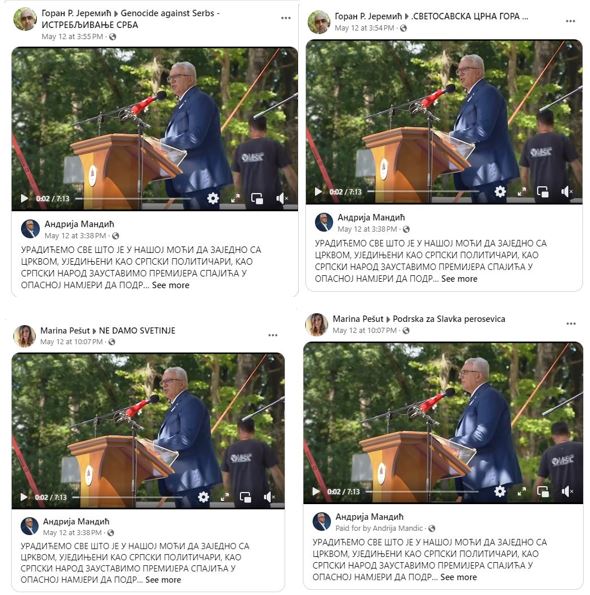
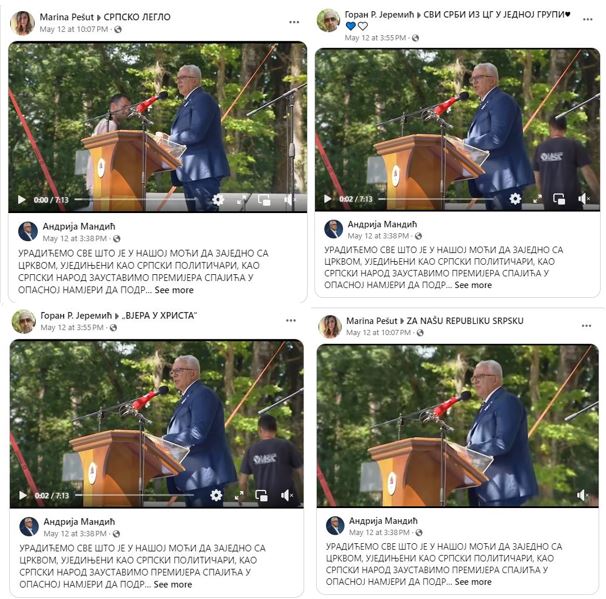
On the social media network Facebook, photos were shared where Prime Minister of Montenegro Milojko Spajić and President Jakov Milatović are labeled as traitors and Montenegrin Ustasha, stating that it is necessary to overthrow the government that labels the Serbian people as genocidal.
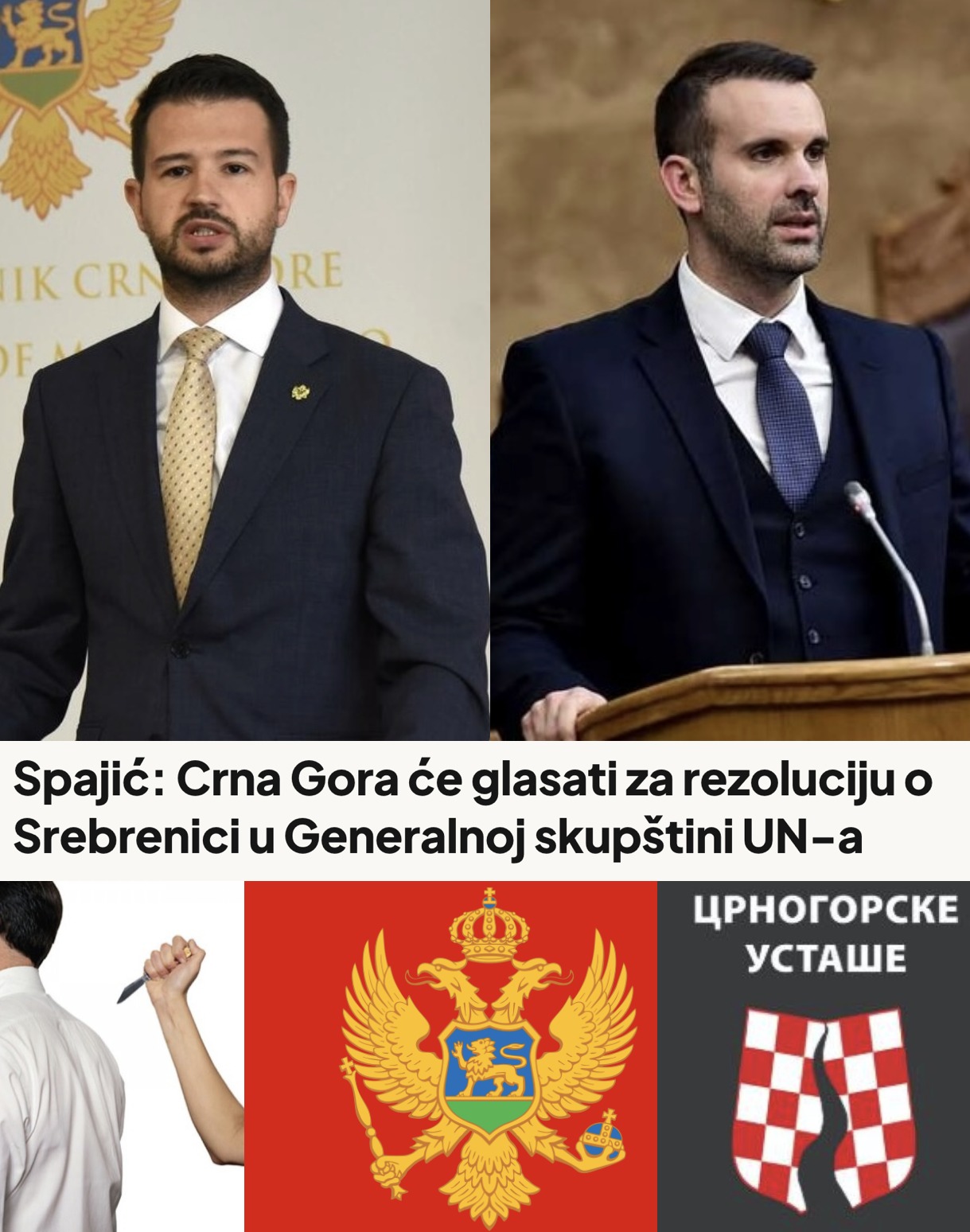
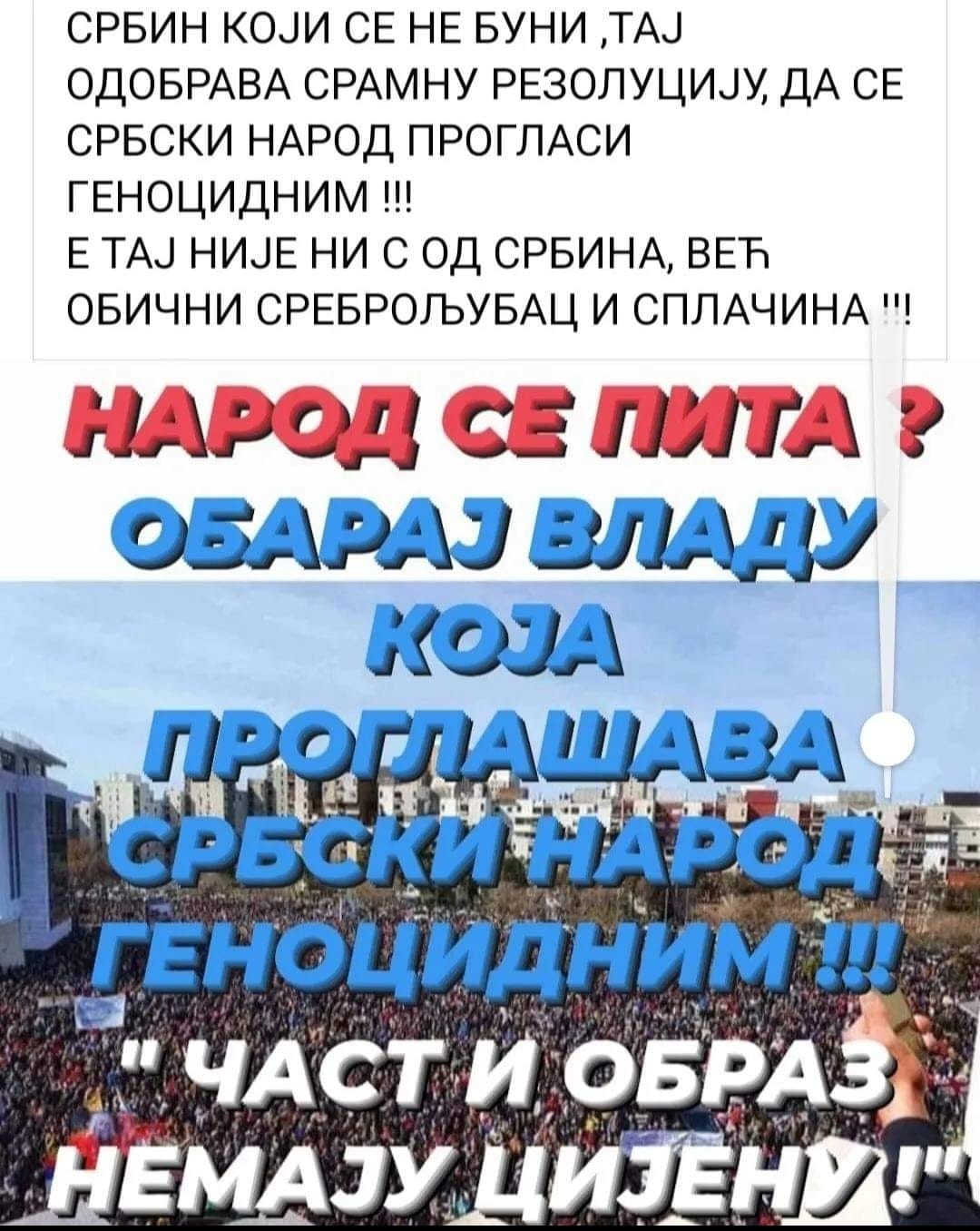
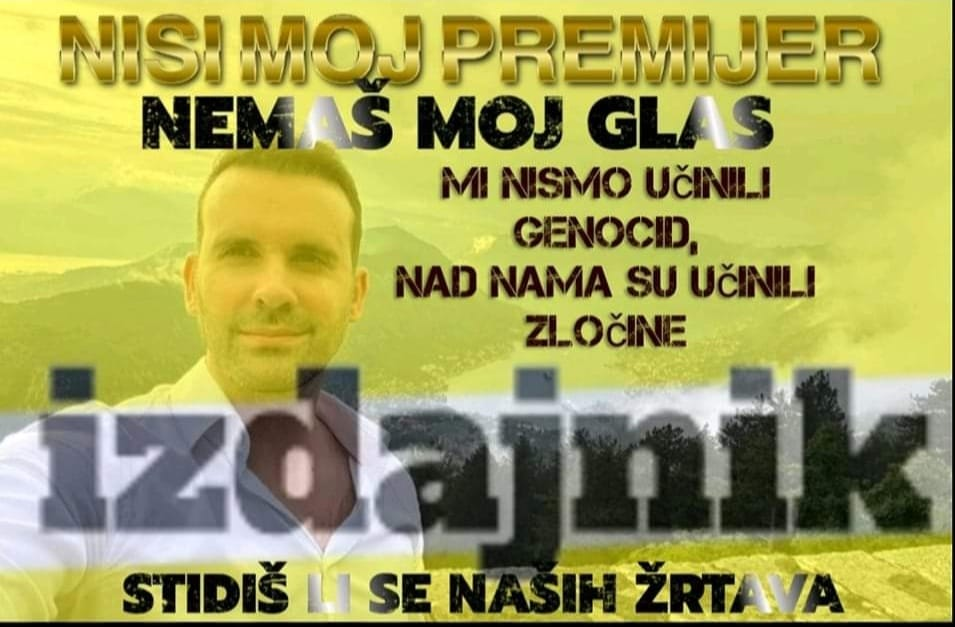
Actors and Organizations
The decision of Milojko Spajić’s Government for Montenegro to vote for the Srebrenica Resolution amplified the disinformation campaign led by pro-Serbian proxies. The narratives being disseminated emphasize the endangerment of Serbs in Montenegro and the labeling of the Serbian people as genocidal, aiming at the further polarization of Montenegrin society. Thus, journalist and sociologist Bojan Panaotović claims that the decision is undemocratic because the majority of Montenegrin citizens are against it, while at the same time justifying the Democratic People’s Party (DPP) stance not to withdraw support for the government. According to his words, by the DPP leaving the parliamentary majority, Serbs and the Serbian factor would be at a disadvantage because instead of those in power who fight for Serbian interests, those whose cornerstone ideology and policy is Serbophobia would enter the government, and many would be glad to show the dirty Serbs out of Montenegro on tractors.
Serbian historian and the most prominent advocate for Montenegro’s entry into a federal state or union with Serbia and the Republic of Srpska, Aleksandar Raković, stated to the unregistered portal IN4S that the entire situation regarding the Srebrenica Resolution is serious because it is about stigmas that Western countries want to place on the back of all Serbian people in the Balkans. He characterizes Montenegro’s decision to support the Resolution as stabbing Serbia, the Republic of Srpska, and all Serbian people in the back. Like other Serbian proxies, he suggests that Serbian parties in Montenegro should hold positions in the government and wait for the Government’s reconstruction. Such statements justify the actions of leaders of pro-Serbian parties in Montenegro regarding the Resolution and support for the government and also influence public opinion through emotional manipulations portraying the Serbian people as oppressed, neglected, and endangered. In addition to disinformation and manipulation of facts, Raković emphasizes Andrija Mandić, Milan Knežević, and Vladimir Joković as the only true representatives of the indivisible Serbian identity, directing the people to turn and support the real leaders. Anything that diverges from the actions of these three actors in Montenegro (outside Montenegro are Vučić and Dodik) is considered a political course that leads Montenegro towards anti-Serbdom, the destruction of historical dignity, and turning its back to historical friends.

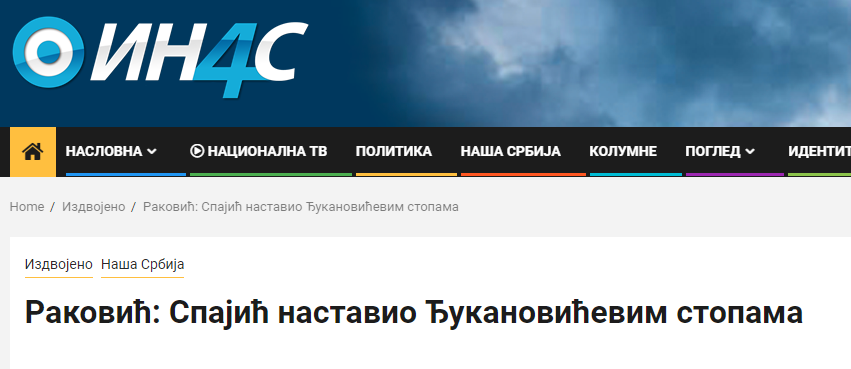
The narrative about the role of the so-called pressure of Western partners on the decision of the Government of Montenegro stands out. Aleksandar Raković emphasized in a statement to the pro-Serbian portal Borba that the goal of Spajić’s Government is to support the intention of the West, Germany, and America to declare the Serbs as a genocidal people. He cited the ultimate goal of the Government of Montenegro as voting against Serbia and the Republic of Srpska.
Historian Bogdan Živković stated to Sputnik Srbija that it is imperative for Spajić to listen to the West so that they would not withdraw their support and topple the government. Milutin Mićović, the brother of Metropolitan Joanikije, also joined the campaign, through emotional manipulation compared Srebrenica Genocide Resolution to the extension of NATO bombings of Serbian lands, emphasizing that this time the collective consciousness, history, culture, and the character of the Serbian people are being bombed. In addition to the claims about Montenegro as a servant of world powers, he introduces the narrative about the superiority of Russia over the totalitarian West.
Organizations with Russian and Serbian affiliations that become active during important socio-political events, and whose actions deny the sovereignty of Montenegro, the distinctiveness of Montenegrin identity, language, culture, and tradition, undermine the secular and civic character of the state and jeopardize Montenegro’s euro-Atlantic path, were active regarding the Resolution on Srebrenica. Those organizations, supposedly engaged in humanitarian and cultural activism, but essentially representing far-right organizations, were the organizers of the protests in front of the government building of Montenegro due to the announcement that Montenegro would support the Resolution on the Srebrenica Genocide at the United Nations. In addition to the aforementioned Orthodox brotherhoods, a branch of the Russian biker organization, Night Wolves, whose activities the DFC wrote about on several occasions, also took part in organizing the protests. The Serbian Cultural Center Patriarch Vrnava, Serbian Society Saint Sava, NGO Herceg, NGO Serbian Thread, NGO Serbian Serdar, NVO Božuri, Serbian Cultural Club Saint Sava, and the Association of Admirers of the Liberation Wars 1912-1918 were also organizers of protests against the decision of the Government of Milojko Spajić. The mentioned associations and organizations promote anti-Montenegrin and anti-Western narratives, are close to pro-Serbian parties, and participated in religious processions during 2020.
The pro-Serbian organization which was also active during the census campaign, the Serbian National Council, led by Momčilo Vuksanović, also played a role in the intensive campaign. The Council, in an open letter to Prime Minister Spajić, called for organizing a referendum on Srebrenica. Similarly, wartime reporter Perica Đaković, who used to report from the Dubrovnik battlefield, made a statement along the same lines. The Viber group Narod se pita reacted to the Srebrenica Resolution as well, calling on part of the parliamentary majority, specifically the New Serb Democracy, Democratic People’s Party, Democratic Montenegro, and the Socialist People’s Party to topple the government if necessary because they will not bear the seal of a genocidal people. That Viber group was created in August 2023 in anticipation of the formation of the 44th government under the name Defence of the Electoral Will, to mobilize as many citizens as possible against the alleged violation of electoral will. The DFC wrote in its analysis Influence Operations Leading Up to the Formation of the Government, about who the group administrators are and how the group acted with the aim of paralyzing democratic processes.
As part of the campaign to obstruct the adoption of the UN Resolution on Srebrenica, pro-Serbian and pro-Russian actors in Montenegro introduced topics that could contribute to slowing down or halting the process of European integration. In that context, the President of the Montenegrin Parliament, Andrija Mandić, emphasized in a statement on May 23, 2024, that he would initiate a process to amend the Constitution of Montenegro if the results of the population census show that the majority of the population speaks the Serbian language. Furthermore, the initiation of the procedure to amend the Law on Citizenship, which Mandić announced in December 2023, indicates that the vectors of Russian-Serbian political action in Montenegro are identical to those before the change of government in 2020. The UN Resolution on Srebrenica illustrates the degree of penetration of Aleksandar Vučić’s politics in Montenegro. The DFC, in its study Unbreakable Bonds or Geopolitical Strategy, using the Overton Window technique, pointed out the methods of operation of Serbian proxies in Montenegro.
Official Belgrade continuously finds support for its malign activities in Montenegro. Since the formation of the 44th Government of Montenegro, Aleksandar Vučić’s regime has been establishing control over political currents in the country through narrative forms about the endangered Serb national being or Serbs as a genocidal people. Given that state bodies are passively and without a clear strategy observing foreign malign interference, leaving the EU agenda in the hands of pro-Serbian proxies represents the greatest danger to political processes of strategic importance. The scope of hybrid actions towards Montenegro in the context of the Srebrenica Resolution, through the activation of all socio-political factors in the region, illustrates the importance of Montenegro on the ideological map of the Serbian world.
During an appearance on the show Centralni Dnevnik with Senad Hadžifejzović on Face TV in April 2021, Serbian President Aleksandar Vučić was asked if the events at Jasenovac constituted genocide. He responded: As president of the country, I do not have the right, I know that as head of state if I were to reach such a conclusion, it would mean 100 years of bad relations with the Croats. It is clear to you what I think privately, but as the president of the state, I have a much greater responsibility and must consider the interests of both the entire region and my country.
As in similar situations in the past period, there was a lack of an adequate response from the Montenegrin institutions to the influence campaign that combined multiple elements of hybrid action against Montenegro. Reactions to the aggressive actions of the Serbian regime and nationalist pro-Serbian and pro-Russian structures from Serbia, the Republic of Srpska, and Montenegro were reduced to a few statements and declarations. The acceptance of the tendentious initiative to consider a resolution on Jasenovac in the Montenegrin Parliament may result in the disruption of relations with Croatia and is calculated to slow down Montenegro’s EU integration process. This move once again demonstrated the lack of integrity and a clear state strategy in combating malign foreign influences, where institutions of the system should play the main role as guarantors of the protection of civic identity and sovereignty of the independent state of Montenegro.

